Crafting Nonfiction Articles: How to Begin
 Writing nonfiction articles can be just as much a creative process as crafting a short story or a poem. I've been thinking about this fact a lot lately because of my news correspondent job at The News-Gazette in Champaign/Urbana, IL. I've recently been writing some "Home and Garden" type articles, and I've had a lot of trouble with my ledes. With the first article, I was writing about a neighborhood garden, and I wanted to focus on the fact that the gardener had pretty much started with a yard full of grass and a few trees, and she has turned it into so many different gardens that she hardly does any mowing. But I was all over the place with my beginning. I started with a statement from the gardener. Then I started with a bit of her history, and finally, I decided I needed to just start with her story. Ten years ago, she had a yard full of grass, and now she has yards full of gardens and hardly has to mow. Simple, easy, and right to the point. In my other recent experience, I was writing an article about a man who has several antique cars and a yard barn made to look like a 1960s Shell gas station. I turned the article into my editor, and she wrote back and said, "I encourage you to have a little more fun with your lede. Be more descriptive." Yes, yes, she was so write. So, I rewrote it and played on the gas station/car theme, saying things like, "The 1963 gas station pump parks itself in front of the gas station," and so on. So, what am I learning about ledes and beginning of articles? I need to go ahead and write the whole article, starting in any way I can--not spend too much time on it in the beginning. But then I need to go back and rewrite and rework my beginnings because ledes are not my strong point. I also need to remebmer the focus of the article and the purpose of the lede: 1. to catch a reader's attention, so he will keep reading 2. introduce the article 3. set the mood, tone, and voice. I can also look at how other writers have started articles for that same publication, and maybe get some ideas from them. All writers have strengths and weaknesses, and there are some amazing writers out there who are so creative with their ledes for NONFICTION! To me, it takes creativity to begin an article and do all three things mentioned above. So, do you have trouble with ledes or article beginnings? Know any tricks you can share? Happy writing! Margo Dill https://www.margodill.com/https://margodill.com/blog/photo by Annie Mole https://www.flickr.com/Labels: articles, Margo Dill, writing beginnings, writing nonfiction
Scheduling to Seize The Day!
You have to sometimes take a step back from what you're doing to admire what others are doing. Not in the comparative, that person is so much better of a writer, so much more intelligent, etc., but just in admiration and as a source of inspiration. Let me explain. As those who've been reading this blog for the past year know, I stumbled into writing not from planning necessarily but from having extra time on my hands and a desire to dabble. I started working on professional writing out of a desire to get on the ground and running so to speak as an anthropologist/science advocate/future museum or university educator. A co-worker of mine is a writer, and the two of us share free time talking about books, yet there's something he doesn't know. His work ethic when it comes to his writing as well as his minute attention to detail with every book he read inspires me. His passion and dedication for what he does and loves is amazing. With that said, while I won't pass up extra shifts at work like he does because he'd "rather work on his writing," I am going to restructure my schedule using his writing philosophies as a model/proxy. My schedule is not going to be a number of words a day or a so many pages each month as some have suggested on this blog, but rather, will merely consist of a loose list of things I hope to accomplish writing-wise by the end of this year and some time blocked out to work towards those aspirations. His schedule is similar, mainly because as he told me, some days he only can get a small passage written only to completely erase it to start anew. His meticulous reading habits must follow through into his writing habits. He sets his day and life around his passion and what he went to graduate school to do (write), and it is about time I perform similar feats when it comes to my own life and work. Even though I was not intending to spend my early post-collegiate years working on my publishing portfolio, there's no reason I should ignore the fact that right now, I have more free time and ideas forthcoming, and there are opportunities out there to seize. Going back to someone's post the other day, I need to get out of not imposing some deadlines which could "whoosh by," or everything (deadlines, accomplishments) will be what ifs and could haves rather than finished products. After all, I know that I am capable of writing and adhering to some self-imposed deadlines once I make them reasonable. Reasonable to me just means something different than it does to my co-worker. I just am in that stage where those extra shifts at work help me out in other areas of life as well as build experience working with college students, so I'm not missing any chances at additional hours; they help me towards my long-term professional goals. He's inspired me nonetheless, and I know deep down his perseverance and commitment will help him produce bigger dividends in the end, towards his own long-term goals. Therefore, drafting a list of goals to achieve by December 31 is my writing task #1 for this upcoming weekend, as maybe in addition to formulating long-term goals several years out in life, it's good to do so in shorter spells of time too. Carpe diem!
I really, really don't mean to do it
I really, really don't mean to push my deadlines to within minutes of, uh, well, their deadlines. But sometimes, things just happen that way. Last week, I was inundated with the annual family visit. (The pleasure and curse of living in a coastal town...a gathering of 31 in various locations around the beach.) The week before, I had incredibly good intentions that were washed aside as I landed on a half dozen calls for various projects. All I wanted to do was sit down to write. With deadlines looming ahead, I was trying to write long before my articles were due. Generally, I try to build a bit of cushion so I don't feel anxious and in a rush about my writing. My interviews were mostly done. Alas, with the pressure building as if in a popcorn popper, I flitted about on business call after phone call the days before the onslaught of relatives. In Kaizen-Muse Creativity Coaching, we encourage people to take small steps. That Friday, I was lucky if I could even consider any small actions. But, before I fell asleep that night, I had made a list...a list of all that I needed to do (which probably used up a good 50 words that might have made it into one of the stories I needed to write). But I took my list into my week of vacationing revelers and made progress, trying to write each morning before everyone woke. It was progress, albeit small progress. A colleague once gave me a magnet with the Douglas Adams quote: "I love deadlines. I love the wooshing sound they make as they fly by." I've never enjoyed the whoosh, so I tend to get my articles written on time. But every so often, I need to release some of the built up steam. And ask for an extension. Last week, I did that a couple days in advance of the deadline--and asked for a couple extra days. It was granted. The articles are now written and turned in. But my to-do list still looks longer than a novella. But, day by day, word by word and small step by small step, I'm making progress. Elizabeth King Humphrey is a certified Kaizen-Muse Creativity Coach and freelance writer. She also blogs at CoastalCarolinaMoms.com and TheWriteElizabeth.com, where she contemplates finding creativity...and time to write!...each day. Labels: business writing, daily writing, Elizabeth King Humphrey, freelance, writers deadlines
Interview with Tricia Bowering, 2009 Winter Contest Runner Up
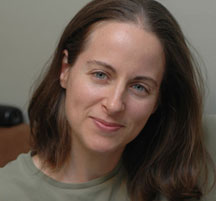 Born and raised in Victoria, British Columbia, Tricia Bowering studied Psychology at the University of Victoria. She lives in Vancouver, where she keeps busy working as a physician and spending time with her partner Alan and energetic daughter Sophia. Tricia remembers writing short stories as early as grade two and all throughout high school, but years of study and work slowly pushed writing aside. Finally, she has returned to writing as a serious pursuit, and has enjoyed reconnecting with her creative voice. If you haven't had the opportunity to read Tricia's wonderful story, When My Grandmother Made Perogies, head to the WOW ! site and take time to devour it. Like a fine meal, Tricia's story is meant to be savored. WOW: Congratulations, Tricia, and welcome to The Muffin. Your story reminds me so much of my grandma. Is this story based on personal experience or is it purely fictional?
Tricia: Much of the fiction that I write starts with a few details from life, either a conversation or an image. In this case, I was able to take some of my memories and build a fictional event around them. My grandmother did indeed make perogies that we devoured on our trips to her house, but my daughter hadn’t been born by the time she moved. In some ways, the story reflects what I wish could have happened. I would have loved for my daughter to enjoy the same cherry tree climbing and perogie eating that I did. The story is really a tribute to my grandmother, and her important traditions.
WOW: Those are great memories! Your grandmother sounds like a marvelous woman. Your story definitely fits into a 'keepsake' category. Why are stories that preserve family values and traditions important to tell?
Tricia: Reflecting on the past, and incorporating it into our own lives can be important in many ways. I find myself wanting to explore the themes of my childhood as I get older, perhaps as a means of connecting to previous generations. Now that I have my own home and family, I’m trying to create traditions of my own. I’m beginning to understand the ways that my grandparents and parents instilled a sense of meaning in my life, and I don’t want to lose those memories.
WOW: Keeping and building traditions is so important. Your family will appreciate them as they grow, too. You use a quite a few sensory details. Why is it important to use those details to paint a vivid picture for the reader?
Tricia: Without a lot of action in the story, vivid description became particularly important. I tried to describe the scene as if from a child’s point of view, with all the wonder that it encompassed. Since the story was so much about the perogies, I wanted the process of making them to come to life, evoking a special time and place. I used other details about the house and the past to create a sense of nostalgia, something I felt while writing.
WOW: (smiles) That sense of nostalgia comes across. Let's talk about the writing process. What's your writing routine like?
Tricia: It’s irregular, at best. When I have a writing project on the go, I tend to set aside writing time each day. My mantra is “an hour a day for writing”. However, when life gets busy, or I’ve just finished a piece, I tend to slow down a bit. Sometimes, it’s just a few hours of writing on a day off, once a week.
WOW: Great mantra! Even experienced writers need to be reminded of that. It's difficult to always make time to write, and you are a busy woman. How do you balance working in the medical field with family and writing time?
Tricia: First off, family comes first! Balance in life is difficult and I’m always busy, but I try not to use that as an excuse. Although finding time to write has been a challenge, I feel such a sense of accomplishment and pleasure in crafting and completing a story that it’s so worth it. It’s only been a year since I’ve taken up writing again, and reconnecting with the creative part of myself has been a great journey.
WOW: Good for you! Keep on the "write" path! Due to study and work, you weren't able to express your creativity. Why is it important for people to stay connected to their creative voice?
Tricia: So many parts of my life are enriching. Both work and parenting challenge me in different ways, but as I begin to have a bit more spare time, life is quiet enough to allow me to reflect on my experiences. Beginning with a blank page and ending up with a finished story that is meaningful to me is very satisfying. It challenges me in different ways than studying and working. I’m sure that the importance of creativity is different for each one of us.
WOW: That's so true. It depends on what our interests are. What types of writing do you prefer? Has any of your work been published elsewhere?
Tricia: I’m still exploring different types of writing, and it’s a fun process. I like to write flash fiction and longer short stories, taking my inspiration not only from life events, but also from interesting contest prompts. At the moment, I’m having fun rediscovering language, playing with phrases and description. I’ve never used my thesaurus so much! I’ve not been published yet, but here’s hoping…
WOW: We'll keep our fingers crossed for you! What projects are you currently working on?
More short fiction. I’ve got lots of ideas in my head waiting to be written down, and the difficulty is which one to tackle first. As for the future, who knows? I’m enjoying the journey right now.
WOW: And enjoying the journey is so important for a writer. Good luck with your endeavors. What advice would you offer to fellow writers?
Tricia: Taking up writing again has shown me that it’s never too late to start something new. I hope that these contest events inspire more women on their own pathways to creativity.
Interview by LuAnn Schindler Labels: LuAnn Schindler, Tricia Bowering, Winter 2009 Contest Runner Up
What Makes a Great "Beach Book"?
by LuAnn SchindlerWar and Peace shows up on many "classics" book lists, but is it a great beach book? NPR readers and listeners think so. NPR will release their " 100 Best Beach Books Ever" list on Wednesday, July 29. Sure, a lot of publications print a "best beach books" list as summer draws near. But what exactly constitutes a beach book? It seems there's a difference of opinion. Reader's Digest offers a list and notes that the books "aren't the usual big-name suspects you'll see elsewhere." Oprah offers "sweet, salty reads for bathing and beyond." NPR reports that "while all books on the list should be enthralling enough to inoculate vacation-goers against the vagaries of missed flights and bad weather, many 'great books' aren't great 'beach books'." Heck, the information superhighway is loaded with sites and blogs offering their self-crafted definition of the term, ranging from romance to classics to graphic novels. Does it need to be a fluffy, light read? According to the blogosphere, several bloggers believe a beach book isn't necessarily literature (note to self: literature, by definition, is a written work so a novel is a work of literature) but an entertaining, light read that can be consumed before sunscreen wears off. And here I thought that a "beach book" was any book a reader selects to read while at the beach, or outdoors, or wherever you feel like reading. My summer "beach read" is Devil in the White City by Erik Larson. It's not sexy; it's not light. But it is engrossing and that is what draws my attention to any novel. NPR patrons presented 600 titles for consideration. Reviewers and editors narrowed the list to 200 and then readers voted for their top pick. To me, the list of 200 contenders is a conglomeration of classics and popular fiction. I've read 28 of the 200 novels, and 20 more titles are on my bookshelf waiting for a trip to the beach. Or my front porch. What's your summer beach book and where's your summer reading spot? Labels: beach books, beach reads, LuAnn Schindler, NPR top 100 best beach books, summer reading
Are You Doing Your Homework?
By Jill Earl "Being a writer is like having homework every night for the rest of your life." Check out this quote from producer, writer, and director Lawrence Kasdan. I have to admit that I didn’t really think too hard about his words until a couple of days ago. Then I had a 'lightbulb moment'. I never viewed my writing as homework before. That poem you’ve been writing, the one where you’re stymied by the stanzas? Homework. What about the final touches on the white paper you’ve put together for a client? Or the family research you conducted for your memoir? You got it, homework. Even those moments of writing you squeeze into your daily schedule can be considered homework. Bet you thought homework was left behind once you graduated and the degree was in hand, didn't you? I certainly did! But, think about it. A writer isn’t doing ‘busy work’ once they pick up the pen or start typing on the keyboard. If they’re serious, they’re working at their craft and building their career. Right now, I’m working on an 750-word article suitable for submission for a peer critique session I’ll be in at an upcoming conference. The topic’s been chosen, the research done, and I’ve been busy putting it together. The thing is, just about everything you do to improve your writing can be considered homework. And that’s one of the goals you’re shooting for, right? So, are you doing your homework? Labels: 'Are You Doing Your Homework?', Jill Earl, writing
Friday Speak Out: Writing - It’s There When I Need It, Guest Post by Marci Mangham
Writing - It’s There When I Need Itby Marci ManghamMy life took what you might call a turn for the worse about a year and a half ago. My physical and emotional health suffered, and I’m still trying to put myself back together. One of the things I left behind was my writing. It wasn’t by choice or planned; it simply fell by the wayside, along with many other things that made me happy and healthy. I was advised to put my feelings in writing, which made perfect sense. Even if I didn’t have any fictional tales brewing inside of me, at least I could write about my pain. No one ever had to see it, but it would be cathartic. Writing as therapy. But I couldn’t even bring myself to do that. As I slowly began to emerge from the darkness, I started to wonder about myself. How could I call myself “a writer” if I didn’t turn to writing during the dark times? How could I be “a writer” if it didn’t come naturally to me, if I didn’t NEED it? I read about so many other writers who need to write to feel whole. They would write on the sidewalk in chalk if pen, paper and computers ceased to exist. Years ago I wrote a novel that in the end I decided was terrible, and I threw it in a Dumpster. I didn’t write for a few years after that. When I started again it wasn’t really a decision. I just began, and it felt natural. Eventually I realized that I had enough short stories to put together a collection, and I published it. It seemed so easy at the time: write stories, enter contests, publish book. A few months ago I suddenly felt that I needed to end the dry spell. I entered a 24-hour short story contest; I felt the challenge of having 24 hours to finish, and the starting point of a prompt was just the right recipe. I was right. After a slow start, the words began to flow again…naturally. What was wrong with me those preceding months? I got an honorable mention for that entry, but the real accomplishment was getting my perspective back. Sure, it feels good to have gone a few rounds my nemesis writers block and won. But most of all I realized that I don’t control my writing; it controls me. I know I can’t force it, and I can’t keep away from it when I need it. While I may envy those who spend hours every day, writing any and every chance they get, I realize that I am not like them. Writing means different things to all of us, serves different needs at different times and durations. Whether I spend every day of the next three years finishing the novels I’ve started, or if I don’t eke out another short story for five years, I will embrace the process of writing, and the end result, whenever it graces me with its presence.  Marci has been writing (when the mood strikes!) for 29 years. Her short story collection, "Both Ends Burning," was published in 2007. She lives in Dallas, Texas with her neurotic dog, Charlie. For more information, visit www.marcimangham.com Marci has been writing (when the mood strikes!) for 29 years. Her short story collection, "Both Ends Burning," was published in 2007. She lives in Dallas, Texas with her neurotic dog, Charlie. For more information, visit www.marcimangham.com
~~~~~~~~~~~~~~~~~~~~~~~~~~~~~~~~~~~~~~~~~~~~ Would you like to participate in Friday "Speak Out!"? Email your short posts (under 500 words) about women and writing to: marcia[at]wow-womenonwriting[dot]com for consideration. We look forward to hearing from you!~~~~~~~~~~~~~~~~~~~~~~~~~~~~~~~~~~~~~~~~~~~~ Labels: Friday Speak Out, guest post, Marci Mangham, writing inspiration
Children's Picture Book Contest
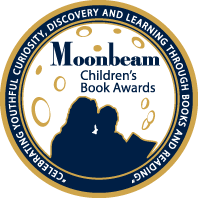 Normally, I love to blog about how writing mixes in with life but I have a fantastic children's book contest to share. Since I know there are several children's authors out there I thought this would be an idea one to try out. It's called Moonbeam Children's Book Awards.
There are many different categories--something for everyone! The entry fee is a bit on the higher end ($95 per book, per category) but it's well worth it. Here's a blurb from their website:
"Presented by Jenkins Group and Independent Publisher Online, the Moonbeam Children’s Book Awards are designed to bring increased recognition to exemplary children’s books and their creators, and to support childhood literacy and life-long reading. Awards will be given in 36 categories covering the full range of subjects, styles and age groups that children’s books are written and published in today."
Good luck and be sure to let us know if you won or placed.
Happy Writing!
Chynna Labels: children's books, Chynna Laird, Moonbeam Children's Book Awards
Interview with Dianna Graveman, Runner-Up, Winter 2009 Contest
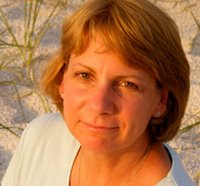 Dianna Graveman was a runner-up in the Winter 2009 Flash Fiction contest with her entry "The Sad Affair of Maxwell Weedon." She is a manuscript editor and former teacher who also loves to write. She has taught most grade levels from kindergarten through college. Dianna’s fiction and nonfiction pieces, several of which have won awards, have been published in the U.S. and U.K. She is co-author of a regional pictorial history, St. Charles: Les Petites Côtes, which was released by Arcadia Publishing in 2009 as part of its “Images of America” series. The story she submitted for this contest was inspired by a trip through the American West, an area she feels never fails to provide writing inspiration. Visit Dianna’s websites at www.dianna-graveman.com and www.gravemanbooks.com. WOW: Dianna, thanks for talking with The Muffin today and congratulations on placing in the Top Ten. Your short story, "The Sad Affair of Maxwell Weedon," has a lot happen in few words. Was it difficult to tell the story of Maxwell Weedon with a small amount of words?
Dianna: This piece was actually an experiment. I haven’t written a lot of flash fiction, but the pieces that have been successful are ones that were originally longer and which I cut to fit the flash fiction word count. That was the case with this one. The longer version included dialogue, but my experiment was to rewrite this story in the style of narrative or literary journalism. After reviewing the judge’s comments and upon reflection, I think I would write it differently now. But I enjoyed the experience, and I’m honored WOW! chose it for the top ten. WOW: Thank you for sharing your process with us. That's very interesting how you cut a longer piece down into a shorter story by taking out the dialogue. I bet we could all learn from doing an exercise like that. In your bio, you said this story was inspired by a trip through the American West. What inspired you on your trip to write this story?Dianna: A historical marker stands along Colorado Highway 141 in the valley of Unaweep Canyon, southwest of Grand Junction. Beyond it, in the shadow of great Thimble Rock, is the remains of Driggs Mansion. According to legend, a New York lawyer built the mansion between 1914 and 1918 for the woman he loved, shipping chandeliers and other expensive items from England. She died before seeing it. Broken-hearted, the lawyer left the area and never returned. According to the Colorado Historical Society, however, the stone masons who constructed the building were from Italy, and the house was designed in Italian rural style. Lawrence Driggs’s original intention may have been to build a large hunting lodge; he sold it in 1923 to be used as part of a ranching operation. Of course, the legend is more romantic, and that became the basis for my story. WOW: Ah, yes, legends often are more interesting than the truth! (laughs) Have you been inspired to write any more stories or works from this trip?
Dianna: Yes. I take at least one trip west each summer, sometimes two. Many of the experiences from those trips become stories: searching for wild horses in Wyoming’s Red Desert, stumbling upon a cabin built in the 1800s by a pioneer woman and her twelve-year-old daughter, traveling up into the Wyoming mountains to “see a cowboy about some mules.” I’m lucky to have good friends in rural parts of Colorado and Wyoming, who are willing to spend time showing me the “real west.” I have also been fortunate to have most of my western fiction stories published, and some have won awards. I’m heading west again in a few weeks, and I can’t wait to bring home another story. WOW: What great ideas to turn your vacation experiences into stories, and they sound very interesting! Congratulations on all your sucess. You have also co-authored a book with your husband about the history of St. Charles. Tell us about writing for Arcadia Publishing and how it was to work with your husband.
Dianna: The people at Arcadia are great to work with; and in fact, we are currently developing three more books for them to be released in 2010: Missouri Wine Country: St. Charles to Hermann; Historic Hermann; and another on Washington, Missouri (title to be determined). My husband, Don, and I did learn some new things about the way each of us thinks. We tend to use different strategies to tackle the same task. And although we spend tons of time together on these projects, it is not leisure time. There is very little of that these days--with one book to promote and three more under development. WOW: It sounds like you've had a great experience with Arcadia Publishing and your husband, and we will be looking forward to the new books you'll have out next year. Three in one year--that's fantastic! What kind of marketing has been successful for your book?
Dianna: Arcadia assigned us a publicist and regional sales team, but of course, they are working with many authors, so we still need to promote our book. We do as many book signings as possible, and we try to schedule them in conjunction with community events. People want to hear about how we secured these book contracts and obtained permission to use old photos, so we give talks and workshops. We make sure the venues have posters and flyers in advance. We engage in social networking, do blog and newspaper interviews, and submit news of upcoming events to local newspapers and to the newsletters of writing organizations. Arcadia sent press kits to most local publications, but I sent press releases to the others. When I found out Missouri Life magazine was doing a feature on St. Charles, I immediately sent them a review copy and asked Arcadia to make contact again, too. It worked: they reviewed the book. There are many other little things, including a postcard mailing we will do in advance of an event in August. We hand out our business card (with our website address) everywhere we go, and we always see a spike in the number of views at our site the day after an event. Interestingly, our campaign to obtain photos and information for the upcoming books has sparked continued interest in the book that’s already on the market. WOW: Thanks for sharing all that great information with us. It always helps to hear what authors are doing to promote their work and how it is working! What projects are you currently working on?Dianna: Besides the three new books for Arcadia, I am working on two middle grade biographies and an anthology of stories for Christian teachers. (I taught elementary and middle school for several years.) For one of these projects, I have a proposal under consideration with a publisher. For the other two, I have done the research and identified potential publishers; I plan to submit soon. Many other writing projects are in the queue; writer’s block is not one of my issues. WOW: It is great that you have so many projects underway, and we hope that you have the time to complete them all! You also work as a manuscript editor. Tell us about your job.Dianna: I am a full-time trade book and magazine manuscript editor for a Catholic publisher. Because our staff is relatively small, I have had the opportunity to learn about many aspects of publishing. It’s been a great education. I also teach narrative journalism in the MFA program at a local university, and I do some freelance copywriting and editing. When I make the transition to full-time freelance writer/editor, I’d love to also teach continuing-ed classes or writing workshops for seniors. I have a writer friend who does that, and she finds it tremendously rewarding. WOW: Thank you again, Dianna, and good luck to you with all your projects, plans, and goals. I am sure we will be seeing a lot of you!
Staying True to Your Characters
 Recently, my critique group called me out. They basically said, "We don't think your two main characters would act this way. We don't believe it." It was a consensus, and so back to the keyboard I went. I knew they were right--I couldn't put my finger on why things didn't seem to be going well toward the end of my young adult novel; but once they said it, I knew they were right. How did this happen to my characters--and at the end of my novel? Why was I forcing them to act in unnatural ways just to get my plot going and my novel finished--finally??? It didn't work--I was miserable; they were miserable--well, you get the point. When I decided to blog about this subject today, I was trying to think of some big universal point I could make about staying true to your characters; but entire books could be written about this subject. So I decided to sum it up like this for now: if your characters are acting "out-of-character," then they need a reason--and a big reason. Think about people you know well--your spouse, mother, best friend, child. You can most likely predict how they will act in a certain situation because you know them well, and you have interacted with them many times. Your characters should be the same way. You know them well, right? How would they act during an earthquake? How would they act if someone was breaking up with them? Unless something HUGE happened to them first, such as a car accident or other life-changing experience, then they shouldn't act out of character. And you will feel it in your gut when your characters aren't doing what they are supposed to be doing--just like you feel it in your gut when you, yourself, are not acting like you should be. I am so happy that my characters are now back in line--acting the way they are supposed to be acting. My plot is fixed, and I am on my way to the end of my novel as soon as I find the time to write that ending--ah, but that could be another blog post. Happy Writing!
Margo Dill
Labels: critique groups, fictional characters, Margo Dill, staying true to characters
Finding Readers for Initial Drafts: How Do You Do It and Why?
In your opinion, who makes a better editor/proofreader/critic? Do you often go to a spouse, a significant other, a family member, a friend, a colleague, a loose acquaintance, or are you stubborn enough to do it yourself until you're at a point when you're ready to send it off for final submission? In my world, I tend to do it myself. Back in the day, I'd ask my mother to read some of my papers for school, but even then, it was just because I'd procrastinate on even getting started so there was not time to take a step away and come back to it with a fresh mind. Nowadays, I will toil on something, gutting and starting anew, and in the end, while I have some pride in my self-sufficiency, I'm left with self-doubt if my academic writing is improving at all over the years. Somedays, it's this feeling of what if I'm in a stagnant quagmire with editors who are too polite to tell me that my writing's lousy? How would I even know? I guess what it all comes down to is the following. Do many writers and authors pass along a draft to another person not as much for a proofread, but for a semblance of reassurance that the idea is good, the plot is interesting, and the artistry is top-notch? If so, who makes the ideal reader/audience? Do you tend to rely on the same cheerleaders for you, or do you venture outside the group sometimes too? How do you find a truly honest reader versus a friend who feels like boosting your self-esteem more than being forthright? Likewise, do you often reciprocate with read-throughs? I love reading others' drafts, but waver on ever asking anyone to look at mine. I'd love to hear your input as always. It might help me change my ways so I start becoming a more self-confident writer in my discipline.
Actively writing while still learning the writing business
At an authors' luncheon the other day, I ran into a writing friend who had published a book and was one of the featured presenters. Whereas I was just enjoying a free meal. During a lull, we started chatting about publishing and how her writing career had been doing since she published her book. Her book contract had underwhelmed her, it seems, but she signed it. The week her book came out, two people close to her died. Promotions were put on hold and she had to take a new job across the state from where she was born and reared. Her job has little to do with her writing. She remains upbeat and she has a couple other books she's working on. Our discussion meandered into what others in our circle of writing friends were doing--all veterans of a graduate creative writing program. There was discussion of how a business class on publishing might have helped us, giving us a better understanding of how we might operate as business people to more effectively capitalize in the marketplace. Gosh, even a class by a business professor on analyzing a market or creating a marketing plan, geared towards book publishing, would have been helpful. Or what to look for (or not) in a contract. Sure, it might take some of the magic out of the creative element of writing, but I think my friend seemed to have some sadness that her book's promotional time was short-lived. "They move on so quickly," she said. Soon after graduation (and giving birth to two children), I realized I would need to take a different path in my writing: I have worked in marketing and PR, expanded into blogging, written for newspapers, taught strategic communications, and now have returned to writing scripts for television. I continue to write for a living and love it. But I still need lots of help when analyzing markets and magazines! Elizabeth King Humphrey is a certified Kaizen-Muse Creativity Coach and freelance writer. She also blogs at CoastalCarolinaMoms.com and TheWriteElizabeth.com, where she contemplates finding creativity in everyday places. Now, she is back to her business(es) at hand...!
Friday Speakout: Never Too Late, Guest Post by Kim Smith
Never Too Lateby Kim SmithFor years, I did not write. For those same years, I felt angry at this failure, and I mourned the writer inside me that I thought I'd lost forever. It wasn't until I'd made a life-changing decision that the writer's block was shattered, and only then did I realize why I had not written a single word. As writers, we need to create a life that will encourage and inspire us to put pen to paper, or in most cases, sit in front of the computer and type our little hearts out. Only recently have I created this life for myself. As a teenager I wrote volumes of angst-ridden poetry. I didn't care how sappy or ill written it might be; I wrote for the sheer joy of writing, and for releasing the vast amount of emotion that dwelled in my tormented soul. It wasn't good writing, but it was honest writing, and I never seemed to run out of things to say. As an adult, I stopped listening to my inner muse. Instead of pursuing my dreams of traveling abroad, of becoming a journalist, of living my life to the fullest, I became a bookkeeper for our family business and remained in the small town I grew up in. In hindsight, I know I could have made this life a better one, but I did not. Fear ruled my life. I married and divorced, and remarried again. I never traveled or did anything exciting. I stopped learning. No surprise I was bored and unhappy; there is nothing worse for creatives than being stuck in a rut, and to not pursue the gifts we are born with. But finally, something snapped. I knew I had to change my life, or die a miserable, unfulfilled person. I found myself on the internet, searching for cheap, rural properties located on the other side of the country. There were so many to choose from. I scanned the acreages and showed the best ones to my husband who, thank goodness, is a wonderful supportive man. When I suggested that we buy one of these places, quit our jobs, and move thousands of miles away from family and friends, he immediately agreed, as he, too, is a stifled creative. This was the first adventure I'd had in thirty years. My husband can drive big trucks, so we bought a semi-truck and trailer to drive across the country. We packed up our belongings and our three cats, and drove from Vancouver Island, British Columbia to Prince Edward Island, staying at truck-stops all the way across. It was the most fun I'd ever had, and for the first time since I was a teenager, I felt myself awakening. This last year we've been building a house and developing our 25 acres. I've started my very first vegetable garden, and I've discovered the joys of hanging clothes to dry. We've got laying hens now, and hope to eventually raise rabbits, turkeys and sheep. Every day I wonder at the peace and serenity this new life has given us. But, best of all, this change has released my muse at last. I've started writing again, joyously, fervently. I've rediscovered the pleasure of creating, and I know in my heart I will never let it go again. I've seen and learned so much on this journey; it's no wonder I couldn't create when I lived in that self-imposed box I called a life. But finding the inspiration to write needn't be as dramatic or as expensive as this. Take a course or class that will challenge you. Become a volunteer. Drive a different way to work, or explore parts of your town you've never been. Take lots of unusual pictures. Stop doing the same old thing and start shaking up your life: a new restaurant, a live performance, or music in the park. Change needn't cost money. Take a walk every night and vary your routes, walk a neighbor's dog, sit in the park and observe the humans that pass by, stroll through the mall and take note of the noises, the colors, and the smells, watch birds from your window, bake some cookies and take them to a neighbor. Reach out and touch the world around you. Don't be shy, or afraid, or hesitant. Life truly is too short. Get out and live a little, or a whole lot! Do not mourn the time you have lost; celebrate who you are now, and forge ahead with a smile on your lips. Inspire yourself, and the words will flow. 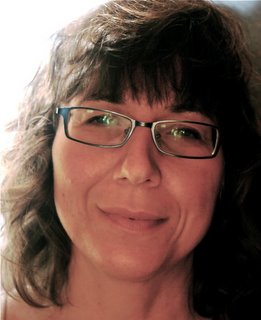
Kim lives in the country with one needy dog, three perfect cats, one long-suffering husband, and far too many chickens. She tries to write on a regular basis after a suffering a writer's block of thirty years. Her only claims to writing fame are placing second in a local writing contest, and publication of a short story in a local writer's magazine ~~~~~~~~~~~~~~~~~~~~~~~~~~~~~~~~~~~~~~~~~~~~ Would you like to participate in Friday "Speak Out!"? Email your short posts (under 500 words) about women and writing to: marcia[at]wow-womenonwriting[dot]com for consideration. We look forward to hearing from you!~~~~~~~~~~~~~~~~~~~~~~~~~~~~~~~~~~~~~~~~~~~~ Labels: Friday Speak Out, guest post, Kim Smith, writing inspiration
Throw Off The Bowlines
By Jill Earl Periodically, I turn to my growing list of quotes when I need a laugh or for inspiration. This quote, attributed to Mark Twain, led me to take a deeper look at what I get out of writing. “Twenty years from now you will be more disappointed by the things that you didn’t do than by the ones you did do. So throw off your bowlines. Sail away from the safe harbor. Catch the trade winds in your sails. Explore. Dream. Discover.” I’m not in the safe harbor as much. The trade winds beckon and grow stronger. And I'm okay with that. This year’s explorations include learning more about scriptwriting and photography. I dream of possibilities as I continue to devour various books on the subjects. Then, I throw off the bowlines and discover. Earlier in the year, I entered a 30-second radio commercial challenge that was sponsored by a writing forum in Britain, and had 24 hours to submit my entry. While I didn’t win, I was tied for their ‘Highly Commendable’ designation, with only half a point separating me and another person. This will come in handy as I gain more experience in crafting scripts. I hope to cast bowlines later this year as I fit in my first photography class, either at a local college or online school. I bought my first digital camera and have been getting acquainted with it at every opportunity, including using it while on a recent work-related trip to Miami. I can see some of those images being used as inspiration for fiction stories, or accompanizng articles. I don’t want to look back twenty years and see myself in the same harbor, disappointment mounting as the trade winds sweep by. I plan to keep on exploring, dreaming and discovering writing. I signed up for this adventure and I’m sure not backing out now. How about you? Have you thrown off the bowlines? Labels: 'Throw Off The Bowlines', Jill Earl, writing, writing inspiration
Winter '09 Flash Fiction Contest Runner Up, Cindy Haynes
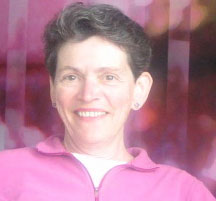 Cindy Haynes Cindy Haynes has written enough stories, essays and mostly children’s tales to fill a very large wardrobe that might just open in the back to some far away time and place. She would rather be with herself and her imagination and her writing than anywhere else. Inspiration comes from friends, daydreaming out a window at the garden and from snatches of life such as walking by a limousine recently in NY City and seeing a beautiful woman in the back seat crying, while a man in a tuxedo standing outside caressed her cheek. It is easy to live the writing life when your senses take in all about you. When not writing, Cindy runs, reads and takes wonderful trips in a 19’ RV named Van Cliburn with her husband Bill and way-too big dog Sadie. Interviewed by Marcia PetersonWOW: Congratulations on placing as a runner up with your story, “Windows of Change.” What inspired you to enter the contest? Cindy: WOW is like Christmas every day. I wake up each morning, grab the coffee and head to my computer to keen the essay of the moment. I love your 750 word limit. First I just write away at my dream or experience of the moment. Then I repeatedly hit word count and smile. The fine tuning is a skill that I learned at a three week Iowa Writer's Workshop with fabulous writer/instructor Chris Offutt. He does something like cut his story into sentence strips and place them around his house. Wherever he is he takes a sentence and rearranges, eliminates, adds words until it is "tight and clean." I'm no Chris. But I love the process. I adore your contest and of course the prizes. You are my inspiration. I bow down to you WOW staff. WOW: Thank you for the kind words about, WOW! Your editing process sounds kind of fun too. Could you tell us what encouraged the idea behind the story?
Cindy: Although I do not think I portrayed it well, my neighbor is my dearest friend and has been for 35 years. And she did lose a child. WOW: I thought it was a lovely portrayal. It seemed like it could be based on real life events. Have you written other flash fiction? What type of writing do you most prefer?Cindy: Yes, I have entered each season for two years now. I was honorable mention last fall and runner up this past winter. I am with you for life! I read contemporary fiction and seem to write that best. However, I have "finished" but not at all fine tuned a young adult chapter book about low lives who are comprised of Mosquito Bite, Brussel Sprouts, Finger Nails On Chalkboard and a few others. Boy do I need help with that. Anyone out there wanna start a YA writing group? Ooops. I should look over what WOW offers. Maybe there is some workshop I can take. WOW: We do have some great workshops available. A YA class would probably be a good addition to the list, so we'll look into that. We’d love to know more about your writing routines. For example, where do you write? How many hours a day do you spend writing? Any favorite rituals?
Cindy: I am missing the part of the brain that "finishes things." Again, WOW is helping me to develop that part of my meager brain. So I do not have a routine where I sit for hours. Any good book will distract me. However, I do write copious emails and work at my essays and chapter book for a couple of hours each morning. I dart for the computer when a new idea comes my way. My computer is in a cubby and all around me are photos of me with greats for inspiration. My latest and most prized is me sitting next to a glowering Lemony Snicket aka Daniel Handler. I'm also partial to the picture of me with Mary McGarry Morris taken at a book signing about 15 years ago. WOW: You mentioned that you take trips in a 19’ RV named Van Cliburn. Where have you been lately and how the heck did the RV get its name?
Cindy: My favorite trip in Cliburn was three years ago when we traveled to Alaska and back from March 31st to July 31st. We had particularly great weather. It was a magical trip. I put together a small book of my essays from the trip. I gave it to fellow writers and to my best fan of all, my 98-year-old mother-in-law, Marion, who inspires me by always asking for more. My husband Bill is a classical and opera music lover. He has taken the same opera course from the same instructor no less than 15 times. The instructor does work with different composers and operas each semester. So Van Cliburn was a fit name for our little home on wheels. WOW: Sounds fun. Do you have any final words of wisdom for our women readers/writers?Cindy: I do know by now as I approach the winter of my years, that one has to have a passion for writing to really get to it. I feel so very blessed that I have the passion. When one loves to read and write, one will never ever be bored. If you are inclined to try writing, start with this essay contest. When you enter, it will be the best ten dollars you spend all summer. You will hit send, smile and begin another adventure story. Have I said thank-you Women On Writing? WOW: Yes, you have and thanks again, Nancy! Best of luck with your future writing endeavors.~~~~~~~~~~~~~~~Join in the fun! Our Summer Flash Fiction contest is OPEN. Check back on Tuesdays for more previous contest winner interviews. Labels: Cindy Haynes, flash fiction contest winner, Marcia Peterson, Winter 2009 Contest Runner Up
Chynna Laird, author of I'm Not Weird, I Have SPD, launches her blog tour!
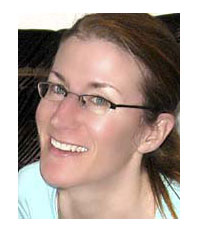 & Book Giveaway Comments Contest! & Book Giveaway Comments Contest!
Chynna Laird credits her adventures as mom of four children under the age of six as the source for much of her writing. When she's not spending Mom-time reading, playing piano and violin, and crafting with her children, she divides her time between being a student and a writer. Chynna is busy finishing up her BA in Psychology, specializing in Early Childhood Development as well as continuing her career as a writer through her business Lily Wolf Words. She's written for many magazines: Amaze, Mindful Mama, Parenting Special Needs and Unique. She also has several bigger projects, including a thriller making the rounds. Her memoir, Not Just Spirited: Living With Sensory Processing Disorder, will be released this August. Find out more about Chynna by visiting her websites: Lily Wolf Words: https://www.lilywolfwords.ca/Blog: https://lilywolfwords.blogspot.com/About her book: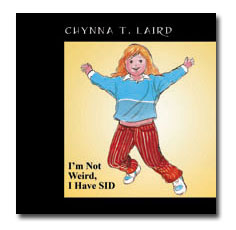 I'm Not Weird, I Have SPD I'm Not Weird, I Have SPDBy Chynna T. Laird Four year old Alexandra describes, in her own words, how it feels to have Sensory Processing Disorder (SPD) readers get a peek at how she hears things, smells things, even how things feel on her skin. She tells readers how frustrating it was for her to try to explain to other people she wasn't trying to be difficult or naughty, she was trying to communicate. Alexandra shows us all the things she does to cope in a world she finds so terrifying and how she helps others understand her better. The book can be used as resource/reference tool for parents of children with SPD; to help children with SPD learn to express how they feel in words; and to educate counselors, teachers, friends and family. Genre: Children's picture book Paperback: 24 pages ISBN: 1432714724 Publisher: Outskirts Press Book Giveaway Comments Contest!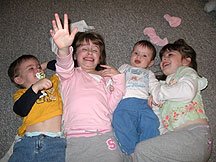
If you received our Events Newsletter, remember, we are holding a contest to win a copy of Chynna's book, I'm Not Weird, I Have SPD, to those that comment. So, grab a cup of coffee, pull up a chair, enjoy the chat, and share your thoughts, and comments, at the end. We will randomly choose a winner from those who comment. Enjoy! Chynna's beautiful children (photo right): Xander (two), Jaimie (six), Sophie (ten months), Jordhan (four). WOW: Welcome to The Muffin, Chynna. We're delighted to launch your blog tour for your book, I'm Not Weird, I Have SPD. [editor’s note: the original title of the book was I'm Not Weird, I Have SID] You've written a variety of non-fiction articles and essays about Sensory Processing Disorder or SPD for various magazines. What made you decide to also write a children's book about SPD? Chynna: Initially, I wrote the story just for my daughter Jaimie who lives with SPD--to validate her feelings. When she was about three, she had an unfortunate experience with a small group of children who made fun of her reactions to them and her behaviour. The book was to help her feel better about herself and also help her see that there were other kids in the world who felt things the same way she did. WOW: Tell us how your book got from idea to publication and how long it took.Chynna: Jaimie loved being read to so I thought the perfect way to reach her and teach her how to talk about her SPD was to write a children's picture book that she'd love and be proud of. I honestly never had any intention of having the entire world read the children's book. I researched a few POD places and chose Outskirts. I got lucky with the people I worked with on my project. They were wonderful and so supportive. I was never pressured to spend more money than I had to. Sadly, a lot of first-time and eager writers are "advised" to spend way more than they have to with some places. My project only took a few weeks from submitting my manuscript to approving illustrations, cover and interior setup to production and printing of my book. I cried the first time I read it to Jaimie and she loved it. WOW: A little birdie told me you're making some changes to your book. What are the changes and why are they being made?Chynna: Yes, I'm currently in the process of revising the book to reflect important changes that have occurred in the SPD community, mostly having to do with important research. When Jaimie was diagnosed with SID/SPD about four years ago, it was known as Sensory Integration Dysfunction (SID), Dysfunction of Sensory Integration (DSI) and Sensory Processing Disorder (SPD). All these acronyms refer to the same condition but there was no universal way to refer to it. It was very confusing. Then shortly after my book came out in October 2007, it was finally decided to universally refer to it as Sensory Processing Disorder or SPD. There were several reasons for this decision. The first, and most important, being that a "dysfunction" can give the impression that something simply isn’t working quite right and a few simple “tweaks” can make things run smoothly again. Believe me, with this line of thought, seeking the right help for a child with this condition can be very difficult. The other point is that SID, as an acronym, was often confused with the tragic Sudden Infant Death Syndrome or SIDS. Finally, there’s a phenomenal SPD research team attempting to finally have SPD included in the next revision of the DSM in 2010 (Diagnostic and Statistical Manual of Mental Disorders). To put it simply, everyone involved with SPD research, diagnosis and treatment had to agree on what to call this disorder in order for it to be taken seriously in the medical field. WOW: You're also adding an activity page. Why did you decide to add that?Chynna: All year long, her classmates knew Jaimie struggled with something because she was often very aloof or avoiding activities requiring closeness, touching or that were too loud/smelly/etc. During the first few months of school, Jaimie had many meltdowns and her classmates were genuinely concerned but didn’t understand what was wrong or how to help Jamie. For example, when upset most children will accept a hug from a friend. But Jaimie yelled, "DON'T TOUCH ME!" or would become even more upset. It was after I'd taken the book to read at Jaimie's Kindergarten class and given a free copy to each of her classmates that I thought of adding the activity page. Almost all of the parents came up to me the next day--some of them tearing up--to thank us for a book talking about SPD from a child's perspective. You see, there are so many reference books out there written for adults who care for or work with these children. None of them really talk about SPD from the child's eyes…in the child's voice. Then it dawned on me that it could help children reading the book with adults to have activities that may help to further their understanding. Children are amazing people and are genuinely curious about things, especially when it’s different. Giving them fun ways to explore SPD and how it "feels" to children who have it may help readers understand it better. And that's so important. Kids like to ask questions and explore…this just helps with that idea. Parents and teachers are always looking for fun ways to explore the subject matter in books they read with children in a deeper way. Activity suggestions already offered in the book helps give the book more "saleability" because the caregiver doesn’t have to either research or come up with ideas on their own. It’s already there! WOW: What's up next for you?Chynna: Well, I have a memoir called, Not Just Spirited: Living With Sensory Processing Disorder (SPD) coming out at the end of August. It's about our journey finding help for Jaimie. It starts with what we went through from when we saw signs that something was wrong (pretty soon after we'd brought her home from the hospital) to begging her pediatrician to listen to us, her diagnosis, therapy, getting into Kindergarten. My story is just to help other parents who have that aching gut feeling that something is wrong never to give up. Knock on those doors until someone listens. Another exciting thing that's just happened is that I've signed on with Sunrise River Press to write a book tentatively called, The Sensory Diet: Setting A Sensational Child Up For Success. Essentially the book talks about the natural, holistic approaches we can take to treating children with SPD using combinations of occupational therapy, physical therapy, nutrition and exercises specific to the needs of a child. I'll also have a great section on childhood anxiety and how it can help this too. (Children with SPD can often have high anxiety. We've had to help Jaimie with both.) WOW: Did I'm Not Weird, I Have SPD pave the way for these new projects?Chynna: It's funny you should ask that. It wasn't my intention but it seemed to have done just that. I honestly never planned for the entire world read the children's book. But one day when Jaimie was in her preschool class, I got to talking with one of the other mothers about Jamie's SPD. Anyway, the mom actually said, "Wow! My son was just diagnosed with that. We always thought he'd had Autism. Do you have any information on it?" I gave her a few resources, including the book I wrote. She came up to me the next day and said, "We read your book as a family and it actually made my husband cry." She asked to buy four more copies of the book. It sort of went from there. Now it's included in several local libraries, SPD therapy centers, Early Intervention resource centers and other places. I'd been working on the memoir for quite some time and had several agents/publishers interested in it. But because the subject matter was so specified (or "niched"), it didn't fit into their editorial line-up. The Sensory Diet project is a compilation of all the research, interviews and stuff I've done over the years in finding what worked best for Jaimie. I thought if I could offer a resource to parents that were in the same position we were in, a book that had all of that information in one place, they wouldn’t have to research as much on their own. This book isn’t going to be a signs/symptoms book but more for parents past the diagnostic stage and into the, "What do we do now? What therapies are there out there?" stage. I still don’t consider myself an "expert" on the subject of SPD. I'm just one parent with one child who has a form of SPD who’s willing to share our experiences, especially if it helps others. I'm a strong believer that we go through things for a reason. I also believe that reaching out to others can be therapeutic in a way. Most importantly, if telling our story inspires other parents to tell their stories, we won't be islands in the middle of nowhere wondering if others are going through what we are. We'll build bridges among us to share our stories, experiences and knowledge and maybe, one day, this disorder won't seem so foreign. WOW: Do you have a piece of advice for hopeful children's authors? Something you wish you had known starting out or something you wished you had done differently.Chynna: The first piece of advice I can give hopeful children's authors is to try your hardest to find an agent or traditional publisher. There's absolutely nothing wrong with doing it all on your own or with POD places (as long as you do your research and find the "right" one.) But you are entirely responsible for the marketing part, including finding buyers. It's not a big deal for me now since I'm not going to school full-time any more but it is A LOT of work and takes A LOT of time and effort. If you don't have that time, hang in there and do it the traditional way. You'll still have to do a lot of your own marketing but it's better to have the additional support and backing. I wished I'd waited for a traditional publishing route but, as I'd said, my initial goal wasn't to SELL my book to the world; it was to help my daughter understand her disorder and to give her the words to make others understand. The best advice I can think of is to understand your intended audience and stay in that perspective. For example, writing for a 5-year old is much different than writing for, say, a tween or teen. Listen to how they talk, watch their mannerisms, watch how they interact with people. I'm lucky because I'm surrounded by my intended audience and they inspire me every day. Children are amazing little people and I love writing for them. In fact, I've decided to focus most of my fiction writing on the children's and YA audiences. Who knows…maybe you'll see me out on the bookshelves in that area one day. WOW: Thanks for giving us so much to think about, especially how a writing project that was essentially a gift of love could make its way from a bookshelf in your daughter's bedroom to a bookshelf in your neighborhood bookstore.Want to join Chynna on her blog tour? Check out these dates and mark your calendar! You can also snag a copy of WOW's Events Calendar HERE. Blog Tour Dates: Come and join the fun!
JULY 13, 2009 Monday
Chynna chats with WOW ! Women On Writing at The Muffin. One lucky commenter will win copy of Chynna's book! https://www.wow-womenonwriting.com/blog.htmlJULY 14, 2009 Tuesday
Chynna stops by Joyce Anthony's blog, Books and Authors, for an author interview and book review! Stop by today and learn more about I'm Not Weird, I Have SPD. https://joyce-anthony.blogspot.com/JULY 16, 2009 Thursday
Chynna visits Raising Socially Anxious Children to talk about encouraging loving sibling relationships when one child has special needs. There is also a book giveaway comments contest! Stop by for a chance to win a copy of Chynna's book. https://www.raisingsociallyanxiouschildrenblog.com/JULY 17, 2009 Friday
Chynna visits Cathy C. Hall's blog, Finders and Keepers, to chat about children's book writing. If you haven't visited Cathy's blog, be sure to stop by--it's bound to spark a lively discussion! https://cathychall.wordpress.comJULY 20, 2009 Monday
Chynna visits Shai Coggins' blog for an author interview! Stop by today and learn more about Chynna's thoughts on writing her first picture book. https://www.shaicoggins.com/JULY 24, 2009 Friday
Have questions about writing children's books? Stop by Samantha Clark's blog, Day by Day Writer, to visit with children's book author Chynna Laird. https://daybydaywriter.wordpress.com/JULY 27, 2009 Monday
Stop by Margo L. Dill's blog, Read These Books and Use Them, to find out what Margo thinks about Chynna's book, I'm Not Weird, I Have SPD, as well as some activities adults can use when reading with their child. https://www.margodill.com/blog/AUGUST 11, 2009 Tuesday
Chynna stops by Allyn Evans' blog, Happily Ever After Today, to talk about the challenges of understanding SPD and raising a child with SPD. Not to miss! https://www.allynevans.blogspot.com/We may have more dates to come, so be sure to check out our Events Calendar HERE to keep up with the latest.Get involved! We hope you are as excited about the tour as we are! Mark your calendar, save these dates, and join us for this truly unique and fascinating author blog tour. If you would like to host one of our authors, or are an author looking to schedule a tour of your own, please email Jodi at: blogtour@wow-womenonwriting.com ** Please feel free to copy any portion of this post. Oh, be sure to comment on this post to enter in a drawing for a signed copy of Chynna Laird's children's book, I'm Not Weird, I Have SPD. Labels: author interview, blog tour, book giveaway, Chynna Laird, SPD, writing children's picture book
Good Housekeeping's Short Story Contest
 To celebrate Good Housekeeping’s 125th anniversary in 2010, editor in chief Rosemary Ellis announced the magazine’s first themed short story contest, focusing on the lives of women today. The breadth of challenges women face and the often heartbreaking decisions that affect their lives are the foundation of the books written by Good Housekeeping’s guest judge, award-winning author Jodi Picoult, whose novel My Sister’s Keeper was the inspiration for the new Cameron Diaz film. Ellis, the editors of Good Housekeeping, and Picoult, who had her first two short stories published in a national magazine while still in college, will select one grand-prize winner and two runners-up. The grand-prize winner will receive $3,000 and the winning story will be featured in the May 2010 issue, the magazine’s special 125th anniversary issue. The runners-up will each receive $750, and their stories will be featured on goodhousekeeping.com. 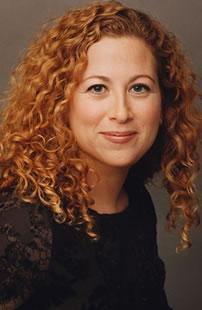 From J.D. Salinger to Daphne DuMaurier, Good Housekeeping has always featured well-known writers. Regular contributors to the magazine have included Ray Bradbury, John Cheever, and Rona Jaffe. More recently, Good Housekeeping’s fiction pages have featured the work of Nicholas Sparks, Maeve Binchy, Allegra Goodman, Jennifer Weiner, Elinor Lipman, Ann Hood, and this year’s guest judge, Jodi Picoult. “Literature has always been an integral part of Good Housekeeping,” said Ellis. “We’ve discovered and published stories by some of the best-loved and bestselling authors of all time and we are honored to have the extraordinarily accomplished Jodi Picoult help us select our winners.” "It is very exciting to be able to read the work of budding writers and to see who might be the next generation of authors to entertain us,” said Picoult. Readers 21 and older can submit their short stories of 3,500 words or less, focusing on the lives of women today at www.goodhousekeeping.com/shortstory. Submissions must be original, not a previously published work or finalist for any other prize or award. All entries must be received by September 15, 2009, winners will be notified in December 2009. Labels: Good Housekeeping, Jodi Picoult, short story contest
Writing Around Life
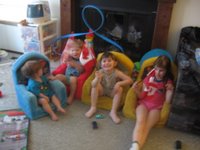 Writing around life.
That seems to be my theme here on the Muffin. But what exactly does that mean? I don’t know about you but I don’t get much writing time in during the day. I am a Mom of four gorgeous children—all six and under and two with special needs—and that’s my main job. Somewhere in there I also study to earn the last nine credits I need for my Psychology degree, tidy the house and all of the little jobs that need doing. But I’m also a very creative person who needs time in each day to BE creative in some way or I go crazy. It’s great doing crafty things with the kids but I’m talking more about ways to express myself through my writing. I’ve always used writing as a way to work things out, calm myself or help me to re-focus. To me writing is soothing…therapeutic. It’s something I don’t do just to earn money. For me, writing is an extension of my heart and soul that I need to tap into a little bit each day otherwise I feel like a volcano brewing to erupt. And after a crazy-insane day, I need the glorious silence and solitude. Okay…I admit those times are few and far between especially since my kids don’t sleep well but I take advantage of bits and bites throughout the day. Here are a few suggestions: * If you have very young children, set aside a little bit of time during naptime. That means leave those dirty dishes in the sink or putting the vacuuming for a little while and take some writing time in. Even if you just give yourself half-an hour, it’s worth it! * If your children don’t nap but still a bit young to play totally alone, take advantange of a designated “quiet time.” In our house, we usually do crafts then my kids watch Imagination Movers while they have a snack. On days when they fight their naps, I squeeze in a bit of time then. * Take your laptop or Neo to the park with you and do a bit of work while you’re watching them play. This one is a bit more difficult for me because Sophie is only one and hates just sitting in her stroller while she sees her siblings running around the park. And she can’t play on her own yet—she stuffs anything and everything into her mouth so I have to watch her constantly. But those of you with older kids can take a it of time then. * Stay up late to work or get up early—just don’t do both. Mamas need rest too or they can’t do their very important jobs. So, either stay up for a few hours after the kids (finally) go to sleep or get up a couple of hours before they do. * Mary Rosenblum told me once that she used to work right in the living room with her boys playing or watching television around her. She said that the deal was if they let Mom do a chapter while they entertained themselves, she’d take them out to the park or somewhere else after she’d finished her work. What I thought was really cool was how Mary said that her writing was THEIR thing not just HERS because they needed to be a team in order for her to work and earn money with her writing. That’s a fantastic thing. * If you get an offer for help with the kids, TAKE IT! I’m pretty bad for that, actually. Until recently I didn’t often ask for or accept help with my kids. But with my business taking off and, now, writing books too, I NEED the extra time to write. 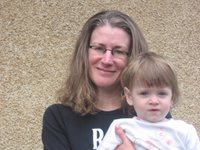 * Let them do it with you. The most amazing thing is that Jaimie and Jordhan like to write little books of their own. So what I do is cut up a gynormous piece of paper into small book-sized pages and they write their own books—complete with illustrations—while I do my work. (One day I might compile their little stories into books because they are really quite good!) It’s fun for them and, until they start fighting over crayons, it’s nice and quiet. These are only a few suggestions that work for us. I still have days where I get almost nothing done. But I find as my little beauties get older, and they need me a little less, I have many more productive days. One day, they won’t need me at all and I’ll have all day to write. Until that day comes—and, secretly, I hope it doesn’t happen too quickly—I’ll keep my Neo close and continue writing around life. See you soon! Chynna Labels: Chynna Laird, Writing Moms
Friday Speakout: Will the Truth Really Set You Free?, Guest Post by Michelle Dwyer
Will the Truth Really Set You Free? by Michelle DwyerI’ve wiped out many a box of tissues because of rejection. Rejection. Those emails with the subject line that reads: Re: Submission. Like most writers, I open the file with a sliver of hope, in the off-chance, that it is a yes. Who am I kidding? Before long, my mind starts telling me that I suck. But now I know: That is simply not the case. Through critique groups and personal connections with other authors, I realize that the rejections are coming from my nonfiction work. Why? My niche rests in writing for a casual audience, not the starched suits that want to know about the latest in anti-virus technology or stock options. For some reason, I felt the need to submit work to the business world, as if its approval made me good. However, after receiving feedback, I did some self-analysis (Maslow would be proud), and discovered that when I write my nonfiction pieces, I’m simply not passionate about them. They don’t evoke the emotions that my fiction stories have always done. I love romance, chance happenings, personal growth, and sex. The stories, characters, and climaxes (pardon the pun), that come from my heart bring me to life, and allow me to create the wonder that is fiction. So how did I end up writing about investing in the manufacturing industry and not about two people making love on the kitchen table? Answer: A warped sense of success. I saw others excel with their nonfiction work, and by golly, I was determined to be like them. How come their works were selected and not mine? For a brief time, I thought they were better than me. It took some validation from peers for me to understand that I shine at fiction, and that I need to ease up on nonfiction. “But I’m an MBA,” I used to tell myself. “I must write articles that tell the truth.” No. My MBA will come in handy with the business side of publishing, but my knack for creating a good story will always give me peace. Don’t get me wrong, aspiring writers (and I am still very much aspiring) need to keep trying and never give up. I just think that all of us have a forte. Mine is creative writing. And now that I know my own truth, I will submit nonfiction pieces every now and then, while trying to hone the craft. But I won’t cry a river when I get rejected. And now I can go back to working on my novels and other short stories. The ones I’ve neglected due to my misplaced effort at finding validity through real-life. Who knows? I might just get an offer. 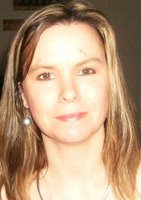
Michelle studied writing in high school and longed to become an author. But circumstances arose, causing her to join the military instead. However, she never gave up. She enrolled in writing school, finished her first crime novel, and will achieve her MBA this fall. She writes as Krymzen Hall at https://www.helium.com/users/421563/show_articles ~~~~~~~~~~~~~~~~~~~~~~~~~~~~~~~~~~~~~~~~~~~~ Would you like to participate in Friday "Speak Out!"? Email your short posts (under 500 words) about women and writing to: marcia[at]wow-womenonwriting[dot]com for consideration. We look forward to hearing from you!~~~~~~~~~~~~~~~~~~~~~~~~~~~~~~~~~~~~~~~~~~~~ Labels: creative writing, fiction, Friday Speak Out, Michelle Dwyer, rejections
In A Flash
It is amazing how our lives change in the blink of the eye. In the past year our family has seen a multitude of changes that have just been unbelievable; 7 deaths in our family (this total includes the loving pets in our lives), the opening and closing of a business, the addition of new adventures to include the search for work, the finding of work and the continuation of search. As I sit here writing to you this morning, I have already gotten myself ready for work, talked to one of my children and had a cat jump on the keyboard of my laptop to help me type. In all, the amazing part, each little piece of what has happened has a story hiding deep inside of it. Who knows it could be a great seller that just my hit the market with such force it could knock everyone for a loop. The real challenge is finding just the write story to use and of course the time. But, you see, even with all of these life changes, I have still managed to find time for my writing. Even if it is for only a few minutes in the morning as I sit eating my bowl of cereal, chasing off the kitten who loves to play with the keyboard. Even though our lives can change in a flash, we all need to take time to find a way to hold on to things that we love to do, things that keep our minds going, help to relax us, help us to understand life in general. For me, it is the little things that seem to make the most difference. One of those very special little things I discovered right here at WOW!, every one of the wonderful women here at WOW have showed me ways that I never imagined could help in my own writing career. Heck, when I first came to WOW, I never thought I could be come a published writer. Now, I am happy to say I have over 300 article published and more to come. Even with all of the challenges that have been faced I feel that they have only made my writing stronger. I have been given a special gift, a gift to tell a story or a gift to tell someone how to build a fence, how to create a Zen garden and my all time favorite, how to create a casserole dish. All with the mighty pen, then the tap of the keys late at night while everyone sleeps. One of the most incredible people that has taught me a lot about writing, even though she doesn't realize it, is Annette, through the years that I have gotten to know her, she has taught me a lot through her writing right here at WOW! I want to congratulate her on all of her life's challenges and all that she has accomplished in her life. Annette, Congratulations, I wish you the best in what is to come. You and all of our many friends right here at WOW are what helped me find myself in writing and you especially help me to drive myself to stick to my guns and continue to write. THANK YOU!!! from the bottom of my heart. Now that life has slowed down a bit, I am met with new challenges, completing many of my book writing goals, with these flashes, I only hope that I can stay on top of things and complete my goals. One of those goals I spoke of some time ago, a book that I am writing for my Grandmother..... "Bob and Doris In the Kitchen." Well, everyone, Happy Writing, I must head off to that office not to far away and as the saying goes.... "Bring home the bacon". Happy Writing!!!!!
The Work Without a Name, No Title to Call Its Own
It has come to my attention through editing articles others have written (as well as in reading book discussions online) that some authors have difficulties or apprehensions when it comes to selecting an apropos book/article title and standing by it. I thought maybe this is something we could wrap our brains around a little bit and see if we can come up with why this may be the case. Many of the literary classics we have likely all read over the years probably went through several changes in title, maybe even up through the final rounds of editing and revision. The initial manuscript may have not changed much, but the titles likely have. A title has a lot of things to do, ranging from attracting an audience of potential readers to being memorable to encapsulating the essence of the entire book into as few words as possible; therefore, many writers feel it has to be just right and enjoy tinkering with it. Likewise, some get so annoyed with the process that they opt to leave this task for an editor or another reader to do. Recently, one of the articles sent my way for a science newsletter had a note attached from the author. Could you come up with a title for this? So, after reading and doing my tracking notes for her, I tossed down a potential title and sent it back to the editor and subsequently, back to the author. That was the title which ended up in print. It was minimal functionalist indeed. It did the job of a title and took a few seconds to come up with after reading the draft. I had worked off a quote in the article and used that as the title, and added a brief sub-title summarizing the article itself. Enough to draw the reader in, yet in the same word choice of the author. I highly doubt anyone would realize the difference in author from title to article itself. Then, the question begs to be asked, what makes the process of naming a work so difficult for some, so easy for others? I personally have never had a paper or piece of writing where I could not come up with a title, nor have I ever changed any of mine, not even when I have rewritten the entire piece. The only changes I have done were in shortening the length, and that was early on in college as I began embracing the more cumbersome title approaches I was seeing in professional journals, yet finding them to be too long in the end. Is titling a work akin to coming up with a thesis statement, meaning that if you know where your paper is going, it is all that much easier to parse those ideas and arguments down and form a single sentence summarizing those ideas and arguments? Or, is it that some cannot detach themselves enough from the work to look objectively at it? Alternatively, is it that dread of twenty years down the road asking one's self, why on work did I name it that? What do all of you think? Please do share any times you found yourself renaming a work time and again or any famous examples of this from literary greats we might know, times where their now-famous works had other titles ascribed to them.
Interview with Julie C. Eger, Winter 2009 Contest Runner Up
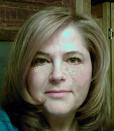 Julie Eger is from the heart of Wisconsin. She has been accused of playing well with others. She is aware that a story unfolds every second; unfortunately she can’t type that fast. Her work has been published in numerous journals and anthologies including Green Prints Magazine, ARGIA, Free Verse, Hummingbird, Other Voices, Bar Code, and Write Away! She is a three time winner of the Wisconsin Regional Writers Association (WRWA) Jade Ring Contest. When Julie isn’t busy with her regular job as a massage therapist she acts as coordinator for The Original Voice, a local venue she founded to help highlight some of Wisconsin’s most hidden talent including seasoned and unseasoned poets, writers, musicians, and artists through feature presentations and open mike events. Julie lives with her wood-splitting/fisherman/plumber husband, a chocolate lab named Aggie, and a black Golden Doodle named Estr. She has two grown sons and two beautiful grandchildren. She didn’t start to take writing seriously until 2004 when she became a member of a local writing group, claiming she had finally found her ‘tribe.’ Much of her writing stems from group assignments but she would love a side job where she gets paid for her writing. It’s true she’s a dreamer, and even though she often gets lost in the words, she always finds her way home. You can learn more about Julie by visiting www.julieceger.com or https://theoriginalvoice.blogspot.com. Interview by Jill Earl WOW: First of all, Julie, congratulations on being selected as a runner-up in our Winter ’09 Flash Fiction Contest! How do you feel?JULIE: Hi Jill, thank you and it’s so nice to talk with you and to be a runner-up in this contest! It feels amazing to have placed within the top ten and I’m still a little shocked to learn I made it this far. WOW: Your entry was amazing! Mama’s Wish Comes True is so powerful! It wasn’t an easy read for me, yet I couldn’t tear myself away from the harrowing story and intense imagery. How were you able to come up with the idea behind your piece?JULIE: This piece stems from my World History class back in 1975. There were images that stayed with me, and the story was born out of that. I was curious if the piece would be too dark for this contest. I get comments from the members of my writing group that I’m too dark with my writing. Sometimes I think I have to get the dark stuff out before I can write something lighter, but I’ve been working on some humorous pieces. I wrote a piece titled Bowling Green about a woman who wrecked her husband’s favorite bowling ball when she bowled over a bunch of little green aliens who kept wrecking her petunias. The writing I did for that was very different from this entry, but I want to learn to write about all kinds of things. WOW: ‘Bowling Green’ sounds like a hilarious read, and I love the play on words with the title. Do you have a writing routine that you follow?
JULIE: My writing routines change with the seasons. In winter, I can roll out of bed writing at 4:00 AM. Then I’ll go through a phase where time is impossible to find so I set a timer and write whatever I can in 15 minutes. I amaze myself at how much I can accomplish in short spurts. Now, it’s summer and I’m all over the board. One thing I’ve learned about myself it’s that I’m consistently inconsistent. I think it’s a multi-tasking thing. The more I have going on, the better I write. When I’m doing something like vacuuming, or driving to the store, that’s when the best ideas come. I have a voice recorder I carry to capture ideas. Once I have the idea, anything goes! It’s my most effective way of writing. WOW: I admire anyone who can write at 4 A.M, but regardless of the time, you've got to write. Those short spurts you mentioned really do add up. And tools such as voice recorders are very helpful in retaining ideas as they come; my PDA goes everywhere with me for that very reason.
Your bio mentions that you didn’t start to take writing seriously until 2004. How did that period of time become a turning point for you?
JULIE: My kids were grown and gone. I had extra time on my hands and one day I sat down to write a brief history of my family, and then stopped at 396 pages, about 6 months later. That experience surprised me in how caught up I was with the idea of writing. I loved playing with words, rearranging them, thinking of interesting ways to phrase things. There was a writer hiding inside, and that experience brought it to the forefront for me. WOW: The process of exploring your family history and discovering the writer inside you is inspiring. And ‘Playing with words, thinking of interesting ways to phrase things,’ appears to sum up the essence of writing.
In addition to writing, you have a regular job as a massage therapist, and you founded and coordinate a local venue called The Original Voice, which showcases writers, musicians, poets and artists in Wisconsin. How do you manage to balance them all?
JULIE: Being self-employed and at the mercy of my client’s schedules, I have no set schedule. It’s like working without a net, and when you do that, you’ve got to find a way to achieve balance in your life or things can start to fall apart. I think the key in that regard is that I’m doing things I love. I love my work as a therapist. I love writing and all that is involved in that arena. And showcasing some of the hidden talent in our rural area is very rewarding. Some of the artists have never performed in front of an audience and it is amazing to see how they shine when they get a chance. WOW: You truly are blessed to be working at what you love! Speaking of The Original Voice, can you tell us how you became involved?JULIE: A few years ago I took a few writing classes, and after one class they held an open mic to showcase our work. I’d never experienced an open mic before. While I was sitting in the audience, I kept thinking, “We need something like this where I live. We have people who have stories to tell.” That’s how it began. It also helped that I had my own microphone, amp, and speaker from when I belonged to an all girl band called ‘The Reflections.’ I think I’ve always had a secret desire to be heard, since my voice is so quiet and I thought maybe other people might have the same problem, the same desire. The microphone unleashes something inside. Everyone has a story and it’s important for those stories to be told. Hearing them in the author’s own voice is very powerful. WOW: How fortunate that The Original Voice has you as an advocate for writers and other artists in your hometown. If you weren’t willing to help your peers get their voices heard through their writing, some would never be known.Besides runner-up in WOW!’s Flash Fiction Contest, you are also a three-time winner of the Wisconsin Regional Writers Association Jade Ring Contest. How have you found success in entering contests?JULIE: When I first started writing I wanted to know if, how, and where my writing might fit so I decided to enter a contest. It was scary to send out my first entry, and I was surprised when it took second in state. I kept sending things in. Some of my work didn’t place, but some of it did, and some entries took first. I was using the contests to help me define what kind of writing suited me. I viewed the judges as though they would be editors considering a piece for publication. Having that background gave me enough courage to send an entry to WOW! I don’t have much training behind me, and it was a gauge I could use to see where I fit and if people liked what I was writing. Through this, I began to see the strength in my essays, poems, and short stories. WOW: Using contests to discover what writing best fits you---I think that’s a great idea. You get to experiment with various forms, while sharpening your skills. It also helps that you didn’t get discouraged when one of your entries didn’t place, but kept the momentum going by entering other contests.
So, Julie, can you share what you’re currently working on?
JULIE: I’m having fun writing simple how-to articles for eHow (thanks to a link from WOW! - see Julie Eger or Jukota at https://www.ehow.com/) but I think the most serious writing I’m doing is a collection of short stories. Even though I wrote a novel (which – by the way - is still available for just the right publisher whenever they’re ready!) and though I’m extremely fond of poetry, I think I’m more of a short story writer. For a long time, I kept thinking I had to write a novel, because that’s what people would want to read, but I’ve found I really like short stories, and if the stories are good enough, people will want to read them. WOW: You definitely have plenty on your plate, but that’s a good thing! What’s one piece of advice you’d like to offer aspiring writers?
JULIE: The one piece of advice I would give is that there is more than one way to become a better writer: 1. WRITE. A blank page will leave you with nothing to send out. Some of my best work has come from just jotting down what was on my mind in the morning when I woke up. If I hadn’t caught it on the page, it would be gone forever. It’s a tool to work from. 2. RESEARCH. Know something about the publication where you plan to send your work. Do you THINK it will be a good fit or do you KNOW if it will be a good fit? Always follow the publisher’s guidelines. 3. SUBMIT YOUR WORK. Buy a stamp and an envelope. Hit ‘send’ on your computer. Use rejections as a tool to help you become a better writer. Use work you’ve had accepted as a tool to help you become a better writer. Write what you love, let it set for three days, read it out loud, make corrections, and then send it out. WOW: Write. Research. Submit your work. Classic advice for writers.
Julie, thank you so much for taking time out to chat today with WOW! Best of luck and we’ll see you on the writing front!Labels: Jill Earl, Julie C. Eger, Winter 2009 Contest Runner Up
Author Vs. Writer - What's Your Title?
by LuAnn SchindlerIn 1913, Gertrude Stein wrote the line "A rose is a rose is a rose" in the poem Sacred Emily. And back in 1594, Shakespeare wrote "A rose by any other name would smell as sweet." Are all roses equal? What makes one rose, say, an author, while another rose is known as a writer? And then there's that third rose, a.k.a. journalist. And the next rose known as a blogger. The roses continue to bloom: copywriter, screenwriter, playwright, poet, columnist, reporter, biographer, essayist, ghostwriter..... What started this rant comparing roses to titles? In this social networking world in which we live and write, it's interesting to see what titles people use...and WHY they select the self-imposed title. In a post I read, a writer mentioned she had interviewed another writer and included a link to the interview. In the next post, she corrected herself and said the interviewee was an 'author' and she, the interviewer, was merely a writer. Merely a writer? Aren't the words 'author' and 'writer' synonymous? The definition of the two are the same: a person who generates or gives existence to ideas. As a writer/author/blogger/journalist/poet/essayist/columnist/reporter, I've generated many ideas and watched them blossom into existence. Isn't that what writers/authors/bloggers/journalists/poets/essayists/columnists/reporters do? Is there a taxonomy to writer's titles? Is one better than the other? Do we writers use a different term to describe our writing existence to different audiences because we want to be viewed in a certain way? Do we really believe that an author who publishes one book is higher on the proverbial writing ladder than a columnist who produces a 750-word work every week? When a writer states she's merely a writer in a public forum, what message is sent to her readers and fellow scribes? In my book, a writer is a writer, whether we write a novel, a poem, a column, or a journal, and a writer by any other name does not necessarily smell as sweet. Labels: Authors, LuAnn Schindler, writer names
Bringing out your influences
One of the joys I find about blogging and writing is being able to take a subject in countless different directions. As we all know, writing is more often than not a solitary endeavor. Blogging (especially when no one comments) can sometimes feel as if you exist in a solitary, well, vacuum. It often gives me pause. As a writer, regardless of the medium, I find that I'm always putting myself "out there." For example, in an article, it might be how I structure the lede, which can give a hint of the influences of my life. Everything that has happened in my life, converging on the page...hopefully in an orderly fashion. There are many scenes in the book "Hope in the Unseen" by Ron Suskind which illustrates this beautifully. One details how Cedric, the product of an inner city upbringing, browses the Brown University bookstore and runs across a biography of Winston Churchill. He had no idea who Churchill was. Cedric's frame of reference is completely different from mine...and from yours. As he makes his way through his first year at Brown, Cedric brings his past, present and future along with him. Blog post or magazine article, this is me--along with all my knowledge, as well as my baggage. And writing seems less solitary after all. Elizabeth King Humphrey is a certified Kaizen-Muse Creativity Coach and freelance writer. She also blogs at CoastalCarolinaMoms.com and TheWriteElizabeth.com, where she contemplates finding creativity in everyday places. She wrote this post alone, with the background influences of her oldest child grumbling in the background. Can you tell?Labels: blogging tips, writing tips
Happy 4th of July! Fun and Inspirational Quotes
 Happy 4th everyone! I hope you are enjoying your day. The photo on the left is one of my favorite places to watch fireworks--the Queen Mary, in Long Beach, CA. I'm going there tonight to watch my friend's fire-dancing troop perform. Hopefully, before then, I'll find some good barbecues or picnics to crash. ;) In the meantime, enjoy some patriotic quotes! ---------
"The United States is the only country with a known birthday." ~ James G. Blaine
"In the truest sense, freedom cannot be bestowed; it must be achieved." ~ Franklin D. Roosevelt"You have to love a nation that celebrates its independence every July 4, not with a parade of guns, tanks, and soldiers who file by the White House in a show of strength and muscle, but with family picnics where kids throw Frisbees, the potato salad gets iffy, and the flies die from happiness. You may think you have overeaten, but it is patriotism." ~ Erma Bombeck
"Liberty means responsibility. That is why most men dread it." ~ George Bernard Shaw
"I have always been among those who believed that the greatest freedom of speech was the greatest safety, because if a man is a fool, the best thing to do is to encourage him to advertise the fact by speaking." ~ Woodrow T. Wilson
"There, I guess King George will be able to read that. " ~ John Hancock, after signing the Declaration of Independence Labels: 4th of July quotes
Social Networking and E-mail: Friend or Foe?
 It's hard to ignore all the press e-mails and social networking I have been getting into the last few weeks. There's the governor from South Carolina, who is in hot water over e-mails to his mistress. Recently, Governor Sarah Palin is back in the news over some e-mail exchanges with John McCain's staffers on the topic of her husband, Todd's involvement with the Alaska Independence Party. Supposedly, he belonged for seven years, and this party's chief goal is Alaska's succession from the United States. Oh boy! One of the worst social networking mistakes happened recently on Twitter with novelist Alice Hoffman. When she read a bad review of her latest book in the Boston Globe and she thought the reviewer gave away too much of the plot, she voiced her frustration on Twitter. She went too far when she publicized the reviewer's e-mail and phone number. She's had her publicist release an apology, and Hoffman no longer has a Twitter account. You can read the full story here.In the last year since Facebook has taken the world by storm, there have been reports of employers checking Facebook and MySpace pages and basing employment on things they have found there. So, what does this tell us? We should learn from these other people's mistakes. We should learn from history. Here are a few tips when dealing with social media and e-mail. Remember, you are a writer, who is trying to build a platform for your work! You don't want to be in the middle of a controversy and ruin your career. - When you are angry, DON'T e-mail, Twitter, use Facebook, or any other sort of social media. Don't blog until you calm down. You can still voice your concerns and opinions and frustration, but you are more likely to do it in a composed manner once you've cooled off. It's similar to arguing with your spouse. It goes much better when the two of you calm down.
- Anything electronic can be leaked and seen. You know the age-old advice--if you have a secret, don't tell ANYONE if you want to keep it that way. The same is true for e-mail (especially), social networking, and blogging. If you don't want what you are writing to be leaked out to the press or your neighbors or your family in any way, then don't write it and send it. Sure, right now, you may be working for $20 an hour as a freelance writer, and you feel no one cares what you have to say. What happens when you write the next Harry Potter novel? Everyone cares what you have to say.
- Never reveal other people's personal information (or YOUR OWN) on social networks. Alice Hoffman made a huge mistake. She should have NEVER given out the book reviewer's personal information. And we all know that. The same is true for your friends and family also. If someone writes on your Facebook wall asking for a phone number, don't respond on your wall. Send the person a private message. If a writer asks you for contact information for an editor and you aren't comfortable giving that out, then don't. GO WITH YOUR GUT! Personal information has a way of leaking out. As soon as you get the reputation that you cannot be trusted, then it will be hard to change that reputation. You can always contact a person for someone else to avoid giving out e-mail addresses and phone numbers
- PHOTOS--Not much to say on this except it is fun to post crazy photos, sure, but you have to think about who is going to see these!
I think social networking and e-mail are our friends, but we have to respect them and be responsible, just like with our human friends. If not, they can easily turn into foes and cause us a lot of trouble. Happy e-mailing!
Margo Dill www.margodill.com Read These Books and Use Them (blog) photo by KaCey97007 www.flickr.com Labels: e-mail, Facebook, social networking for writers, twitter
Extended Deadline for the New Millennium Writing Awards
 There's still time to enter the New Millennium Writings Awards for Fiction, Poetry, and Nonfiction. The deadline has now been extended to July 31, 2009. A total of $4,000 in awards will be given - $1,000 each for the best entry in poetry, fiction, short-short fiction, and creative non-fiction. And as an added bonus, renowned poet Nikki Giovanni will be the final judge for poetry. Tick, tock, writers... Labels: New Millennium Writings, writing, writing contests
Belief In Yourself: A Valuable Writing Tool
Writing is an incredibly competitive field and there are so many of us out there. But there are a good handful of truly gifted writers who always seem to continuously get their work out there and read and have a great following of loyal readers to boot. How do they do that? Because they love what they do and, most importantly, they believe in their work. Belief in yourself and what you do is a major component to success. As a writer, when that belief isn’t there, it comes across in your words and your audience feels it. We’ve all questioned our abilities from time to time and to get over it, you need more than the 10-inch thick skin a lot of people suggest you should have to make it in this line of work. Here are a few suggestions to help you keep up your positive energy: * File away everything insightful and useful that you learn from editors, publishers, writing mentors and peers then discard the rest. Just because someone with more experience offers you his or her advice doesn’t mean you need to take it as gold. Take only what you can use or that applies to. Why torture yourself? * Surround yourself with positive people with a mixture of experience who you know will be honest with you. Having people only give you the good stuff isn’t going to help you one bit. But anything more brutal than constructive criticism isn’t good either. * Wear rejections as badges of honor. This is something I learned from the phenomenal Mary Rosenblum. It takes a lot of guts to send out a query or your entire manuscript to an editor. And it counts. Be proud of that, use the experience to your advantage and do better next time. I can tell you that before it was accepted, my book “Not Just Spirited: Living With Sensory Processing Disorder (SPD)” that’s coming out in August was rejected so many times, I thought I’d need an extra folder to store them! The problem, as I figured out later, wasn’t that it was a memoir or my writing sucked—because I’d had so many editors actually tell me they’d wished they could take it on—it was because the niche was so specialized, it didn’t fit neatly into a category. Once I figured that out and queried the “right” editors, it was snagged up right away. Listen and learn. * Have that one person on your side who believes in you even when you don’t. It could be a writing bud, editor, friend, lover, parent, uncle, aunt, child or best friend. As mentioned earlier, that person should be honest but with a good level of decorum. You need someone to light that fire under your butt when you’re discouraged, beaten down or tired of it all. They’ll help you pick up, dust off and move on. That’s so important. * No matter what never, ever make someone think you have to rip apart everything just to sell it. Of course, you have to make sure it’s “publishable” by having it professionally edited and making appropriate changes. But don’t ever be talked into changing your work into something you never intended it to be. Forge ahead and find that one person willing to take a chance on you. I realize these may seem like simple solutions but they’ve worked for me. I’m one of the most paranoid, insecure people out there (yeah…that’s something to admit to the world.) But I’ve gotten where I am by building up that little light inside of me and allowing people to see it shine and you can do it too. We believe in you all. Please tell us about your own success tips and what you’ve done to get there! Warmly, Chynna www.lilywolfwords.cahttps://lilywolfwords.blogspot.com
|













 We hope you are as excited about the tour as we are! Mark your calendar, save these dates, and join us for this truly unique and fascinating author blog tour.
We hope you are as excited about the tour as we are! Mark your calendar, save these dates, and join us for this truly unique and fascinating author blog tour.

















